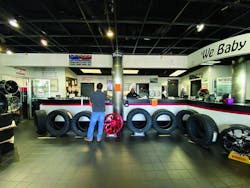Some days, it may seem like you were busier than all get-out, but you didn’t make any money. Other days seemed slow, but you were stunned at how much cash you generated. Sometimes the retail world doesn’t make any sense, does it?
Being “busy” isn’t a good indicator of how much money, cash or profit a business makes. “Busy” is actually a four-letter word.
I think everyone knows that simply increasing sales is the most difficult way to increase profit. You must increase car count and take on more customers. You must spend money on advertising and maybe increase store hours, too.
If your store is doing $1.2 million in sales, making $60,000 a year in profit, and you increase to $1.3 million in sales, you get, wait for it, $65,000 in net profits.
Woo. Hoo.
This is a ton of work for an extra $5,000. And that’s before taxes.
What you need to do is change the things that you sell — and preferably to customers who are already coming in the door.
For the rest of your business-owning life, please remember this phrase: “The least profitable thing you sell is what customers walk in the door to buy. The most profitable thing you sell is what you recommend in connection to that item.”
When I ask tire dealers, “What is the least profitable thing you sell?” the usual answers are tires and oil changes, which is often true, but that scope is too narrow. Other than flat repairs, you must heavily advertise (high expense) and be ferociously competitive (low margin) on most of the services that customers request.
If a customer walks in the front door and asks for a price on tires, there is a high probability he or she has been “researching” prices and will engage in a discount conversation. And what about that customer who brings his or her car in because the vehicle’s brakes are “squeaking?”
There is no surefire, singular customer interaction, but if you look at your conversations with customers at the sales counter and your conversations with customers following a good vehicle inspection, I am positive you will come to the same conclusion: there is simply more profit margin in the things that you recommend, like air filters, cabin filters, wheel balancing, alignments, fluid exchanges and maintenance interval services.
Vehicle inspections and service recommendations are the lifeblood of your business. You simply won’t thrive without them. (Many businesses won’t even survive without them.)
Let’s continue to look at our original example of the store that sells $1.2 million a year and makes $60,000 in net profit. If we were to increase that store’s gross profit margin by just two percentage points on the same sales, we would make $72,000 in net profit or a $12,000 increase.
Our business exists between two guardrails. One is failure to inform customers of needed services. Invasive vehicle inspections occupy the other extreme.
“Failure to inform” means that if you discover that a customer’s car is visibly unsafe without taking parts off, as a professional, you are obligated to inform the customer. “Invasive inspection” is defined as removing parts from a customer’s vehicle, without their permission, to find items to upsell.
The simple solution to all of this is having a conversation with the customer at the beginning. Tell the customer, “While your vehicle is in, we will inspect belts, fluids, bulbs and filters. If we find anything that needs to be addressed, we will let you know.”
If the customer declines and you later find a “failure to inform” issue, simply say, “While raising your vehicle up in the air, we found an obvious safety failure. You didn’t ask for an inspection, but under the law, if a safety failure is in plain view, I have to tell you about it. If you’d like, I can estimate the cost to repair.”
Proper recommendations are critical to your business’ success. As long as you’re doing it for the customer’s benefit and present it that way, everyone should be happy.
Dennis McCarron is a partner at Cardinal Brokers Inc., one of the leading brokers in the tire and automotive industry (www.cardinalbrokers.com). To contact McCarron, email him at [email protected].
About the Author

Dennis McCarron
Dennis McCarron is a partner at Cardinal Brokers Inc., one of the leading brokers in the tire and automotive industry (www.cardinalbrokers.com.) To contact McCarron, email him at [email protected].
